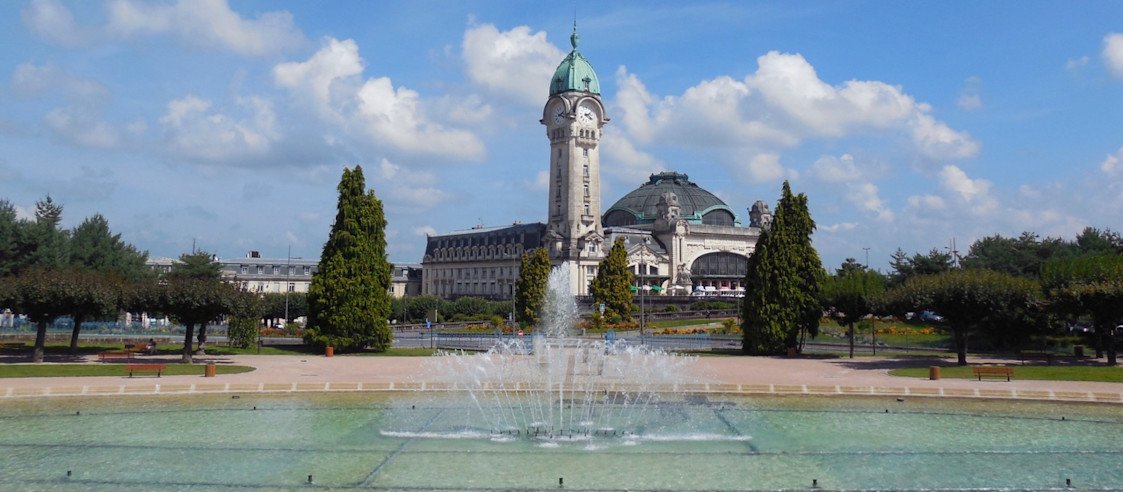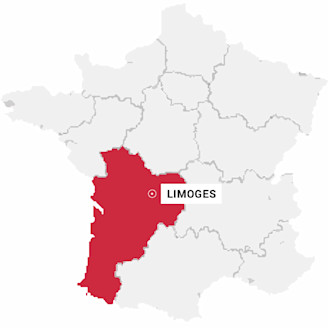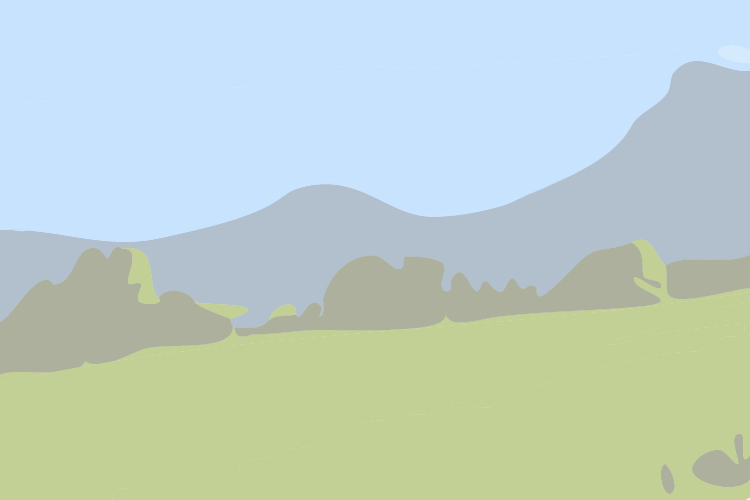IGN MAP



Discover this surprising city and its passion for fire arts expressed creatively through porcelain and enamel.
Saint-Pardoux Lake, less than 30 km north of Limoges, is an unspoilt natural site that's perfect for enjoying all sorts...
Although the emblem of Limoges is porcelain, the capital of firing art is also a « Town of Art and History » that...
“One of the most beautiful stations in the world”. Limoges-Bénédictins train station, listed as a Historical...
No, camping is not just for summertime holidays! Discover my selection of campsites open all year round. An opportunity...
Nouvelle-Aquitaine has all the right ingredients for a perfect family holiday; enchanting historical cities, scrumptious...
IGN MAP

AERIAL PHOTOS / IGN

OPEN STREET MAP


Sales of dairy products and highland beef. In organic conversion.
Products offered: plain and flavoured yoghurts, yoghurts with elderflowers, dessert creams, plain and flavoured tomme, Moelleux des Barres, Highland beef.

To be completed in two or 3 days, the route on the GR®4 and 654 variants, then on the main itineraries between Limoges and Saint-Léonard-de-Noblat, will take you from Porcelaine to the land of cattle breeding and... raymond Poulidor!
The landscapes are varied, from the Vienne valley to plateaus and mountains approaching 400 m in altitude.
Limoges is well worth a visit, with its old quarters, its remarkable Benedictine railway station and its old bridges. The town of Saint-Léonard-de-Noblat (collegiate church and ecomuseums) is an interesting stopover on the way to Santiago de Compostela. Along the way, Saint-Just-le-Martel also offers services, shops and accommodation.
This route is proposed by the Comité Régional de Randonnée Pédestre. Departing from a train station or TER bus stop, it allows you to join a walking or hiking itinerary, and take a stroll in ecomobility!


This trail allows you to discover the history and past traditions of the people of the bridges, and visit the banks of the Vienne, with its well-preserved banks and typical riverside flora and fauna. The aim: find a QR code with a mystery word after solving all the riddles using the app on your smartphone, and above all find a box full of poizs.

The Casseaux museum is home to the Casseaux porcelain kiln, built in 1904. Today, it is a historical and technical site dedicated to Limoges porcelain. This 19th-century industrial building tells the story of the evolution of porcelain-making and the hardships and successes involved in the quest to master fire.
The skills required in porcelain-making include preparing the clay, casting, calibrating, and baking (several times). Special tools, machines, and various utensils are on display in the museum. All of these elements are a reminder of the men and women who worked here, the importance of their skills, and above all, their struggle to master the kiln's flames, constantly striving to perfect their techniques.
The Casseaux Museum is an essential part of the vestiges of Limoges's porcelain saga. It is run by an association, created in the 1980s, by a group of manufacturers who were also history and heritage enthusiasts. It takes visitors on a journey back in time. The impressive 19th-century edifice is built on a historical site. Its architecture is remarkable and it is a true witness to the human and technical achievements involved in the history of the porcelain industry. The presence of old machinery adds to the museum's authentic atmosphere. Its "piece de resistance" is located in the center of the museum: the Casseaux porcelain kiln. The kiln was registered as a Historical Monument in 1987, for its ingenuity and the human symbol it represents. It is France's very last round reversed flame kiln. It was built in 1902 and baked its first porcelain pieces in 1904. It stopped being used in 1957. Its architecture is industrial and it has a capacity of 80 cubic meters. It could contain between 10.000 and 15.000 pieces per batch. The main issue involved in baking porcelain in this kiln was mastering fire: this is not surprising when you consider that each batch took almost a week to bake!

The 17th-century hotel of La Bastide is devoted to the University's Law School. For its renovation in 1996, the architect Massimilio Fuksas associated the initial structure with a contemporary one, where two lecture halls seem to be hanging.

The Adrien Dubouché National Museum is located in the heart of the world's fire arts capital. It presents the different techniques used for ceramic-making. It also traces back through the history of art and civilizations through the prism of porcelain, a matter that continues to reveal its assets today.
Visitors are greeted in an emblematic venue, conceived to enhance all 300.000 of its pieces. After contemplating the original 1900 building, decorated with various pieces of porcelain, visitors are invited to cross the garden to an impressive glass façade, that links the old historical building to the old Decorative Arts School. This unusual architecture shows what a huge renovation program the museum underwent, beginning in 2003. The Austrian architect Boris Podrecca managed the project: a contemporary junction between the two pre-existing buildings, a type of parallel between two temporalities. He gave the old school a cohesive longevity while developing the old historical building's possibilities. This was one of France's largest projects over the last 10 years: the museum doubled its original size to 7.000 square meters, enabling it to become wheelchair-friendly and to host temporary exhibitions. The number of visitors also doubled. Almost 30.000 people come to admire the museum's splendid ceramics, each year since the renovations took place. Special porcelain signposts with industrial typography guide visitors during their tour.
The tour begins with the "Technique Mezzanine" designed by Boris Podrecca: a gallery of light that introduces visitors to the origins of ceramics with 4 blocks representing the different steps of porcelain-making.
The historical building takes visitors on a journey to the genesis of ceramic history. The exhibition hall was inaugurated in 1900. It was designed specially to house ceramic pieces offered by the museum's main sponsor, Adrien Dubouché.
This long corridor's display cabinets is a registered Historical Monument. It presents potteries, earthenware, stoneware, glass, and porcelain in various forms, whether they are artistic, practical, or industrial, from the Ancient Times to the 18th century. When you walk down this corridor, you are taking a stroll through time and civilizations. Ceramics have been part of everyday life since 10.000 BC. By having a look at each item, visitors get a better idea of how civilizations influenced, enriched, and sometimes competed with each other, through commercial, cultural, and intellectual exchanges over the centuries. Porcelain presented important stakes once it appeared in China in the 6th century. It only appeared in Europe in the early 18th century, which gives us an idea of the covetousness it aroused. It was considered a treasure fit for kings, precious and expensive since no one knew how to make it back then. In the 18th century, ceramics became art objects.
New era, new universe for the third part of the museum located in the old Decorative Arts School: much like a classroom, with a colourful labyrinth of cabinets displaying works from the 19th century to today. In the 19th century, artists rediscovered just about everything, whether in terms of culture (the Far East, Japonism, Ancient Egypt...), or artistic movements (Romanticism, Impressionism...). Quite often, ceramics are a stakeholder and even a pioneer of different artistic movements through time.
The last, most prestigious part of the tour: the thinnest Limoges porcelain collection in the world. The scenography was completely reinvented during the museum's renovations. It wraps visitors up in an incomparable architectural atmosphere. The ray of light from the room's glass ceiling shines upon the display cabinets, lighting them up like immaculate treasure chests containing porcelain gems.
Visiting the Adrien Dubouché museum means understanding the evolution of the world's civilizations, exploring the History of Art, contemplating the genius of Man and discovering the golden age of Limousin porcelain that continues to evolve today. In May of 2012, the museum created a partnership with the public Institution of Sèvres to create the " Cité de la céramique - Sèvres & Limoges". This partnership shows Limoges's worldwide aura and makes the museum a "must" on the "Route de la Porcelaine".

This tour explores the history of porcelain, which set the pace for the town's development and made it famous the world over! The aim: find a QR code with a mystery word after solving all the riddles using the app on your smartphone, and above all find a box filled with poizs.

To understand the mysteries of its making, admire the art workers’ know-how, the richness of its products, and the contemporary artists’ creations, the Fondation Bernardaud invites you to a new kind of tour. In the factory of Rue Albert Thomas in Limoges, built in 1863, a tour shows you in detail the different steps of the manufacturing process, from the raw material to the finished product. The tour includes a display of manufacturing techniques and of decoration. Each summer, the Fondation Bernardaud organises a big exhibition around ceramics.

The War Resistance Museum, in the heart of historical Limoges, opened in 1989. A collection of weapons, objects and authentic documents are used to depict the different forms and actions of the local resistance movement. The museum approaches the themes of Nazism and Deportation. The museum also organizes temporary exhibitions (with an entrance fee.)

Venez découvrir la peinture à la main sur porcelaine. Avec l'aide d'une décoratrice professionnelle expérimentée, des couleurs, des pinceaux... cours de dessin d'art, nature morte, perspective, initiation à la couleur...

Julien, le maître des lieux met à l'honneur les boissons et les mets de sa région, en proposant des bières de brasseurs limousins, boissons de distilleries locales et en faisant ses courses aux halles ou chez les meilleurs fromagers de la ville.

Fabricant et décorateur sur porcelaine : arts de la table, boîtes, luminaire. Décoration : bleu de four, fantaisie, peint à la main, personnalisation.

This large 18th-century-style building, designed by the Brousseau brothers, used to be the town's Bishop palace.
The building was also used as a fire station as well as a hospital. It was restored from the 1802 concordat, onwards into the 19th century:
- Its chapel kept its altar, and above it, the painting by Suvée representing Saint Louis adoring the relics of the Passion, in a frame sculpted by
Babel (1772) but in the second half of the 19th century, a Neo-Romanesque tabernacle, tapestries, an Aubusson carpet, and stained-glass windows were added on.
The Episcopal palace was unoccupied at the end of 1906 when the law separating the Church and the State was applied. The building became a registered Historical Monument on September 16th 1906. It was acquired by the city of Limoges and in 1912, became the municipal diocese museum, and more recently, the Limoges Fine Arts Museum. The museum now houses many treasures: a unique collection of enamel from all over the world (Medieval "Champlevé" copper enamel, painted Renaissance enamel, as well as Art Deco and Contemporary enamel), Impressionist paintings (particularly by famous artist Renoir, who was born in Limoges), pieces that date back to the Gallo-Roman and Ancient Egyptian eras...

This route allows you to discover Limoges by night, passing illuminated monuments and, in fine weather, enjoying the city's many terraces and lively streets. The aim: find a QR code with a mystery word after solving all the riddles using the app on your smartphone, and above all find a box full of poizs.

Esprit Porcelaine, c’est 30 ans de créations plurielles. Le collectif d'artistes affirme son goût pour les formes nouvelles, avec la volonté de maintenir l'image d'excellence de la porcelaine de Limoges. Depuis 1984, ses créateurs imaginent les objets d'aujourd'hui et de demain.
Esprit Porcelaine est porteur de projets relevant du très haut de gamme et de l'objet d'exception, où créativité, noblesse des matériaux et prestige sont étroitement associés. Ancré dans son territoire, il coopère étroitement avec les entreprises locales pour la fabrication et l'édition de ses modèles.
Un espace de vente et une exposition permanente de leurs créations se trouvent au magasin Table de Limoges (Médart de Noblat) à Boisseuil.

Objectif : Que ce métier de Cuisinier reste à jamais une passion d’enfant. Spécialités de boeuf-chataigne-cèpes.

Créée en 1996, l'entreprise « Porcelaine Pierre Arquié » est spécialisée dans la création et la production d’objets en porcelaine personnalisables. Sa capacité à prendre toutes les formes, son touché, sa couleur, sa richesse font de la porcelaine un nouveau support et un nouveau segment de marché au sein de leurs collections.
Labellisée Entreprise du Patrimoine Vivant, l’usine se trouve dans d’anciens locaux de filature et de tissage, en bords de Vienne. Elle combine l’atelier et le magasin d'usine. L'entreprise, qui met en œuvre l’ensemble du processus de fabrication sur place, se visite sur demande et sur rendez-vous.